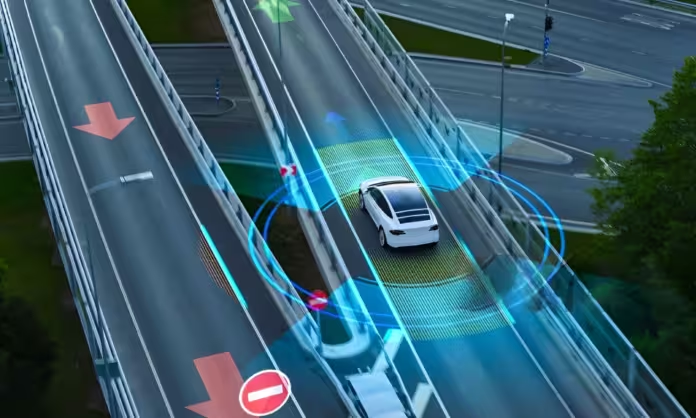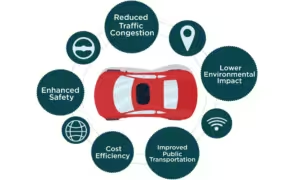Smart is the trend nowadays, and rightly so. Making smart choices, decisions to further better the plans and management saves you resources and money. One of the issues with the planning of the cities is transportation or the mobility across them. There is a need for smart management across all transportation networks. Mainly, the cities with high populations are in desperate need of management. In this blog, we will weigh what smart transportation is, its benefits and real-world examples of cities managing transportation smartly.
What is Smart Transportation?
With the help of technologies like data analytics, artificial intelligence (AI), IoT, smart transportation makes moving around the city convenient, easier, cost efficient and safer. The proliferation of emerging technologies like IoT and 5G technology facilitates new possibilities.
How does Smart Transportation help to make cities better?
Smart transportation is revolutionizing how cities move people and goods, offering innovative solutions to some of the most pressing challenges in urban mobility. With rapid advancements in technology, transportation systems are becoming more intelligent, interconnected, and efficient. From reducing traffic congestion to cutting down carbon emissions, it offers a glimpse into the future of urban development. The core of smart transportation lies in connectivity. Vehicles, infrastructure, and even pedestrians are equipped with sensors that gather real-time data. This information is then analyzed and used to make on-the-spot decisions, such as adjusting traffic light timings, rerouting vehicles to avoid congestion, or notifying commuters of the fastest routes.
Benefits of Smart Transportation
The transition to smarter transportation systems comes with a wide range of benefits that positively impact both individuals and the broader community.
- Reduced Traffic Congestion
One of the most significant benefits of it is its ability to reduce traffic congestion. By using real-time data and predictive algorithms, cities can manage traffic more effectively. Smart traffic lights, for example, can adjust their timings based on traffic flow, minimizing unnecessary stops and reducing the time vehicles spend idling. This results in smoother traffic and fewer delays, especially during peak hours.
- Lower Environmental Impact
These systems also contribute to environmental sustainability. Electric vehicles (EVs), combined with smart charging infrastructure, help reduce greenhouse gas emissions. Additionally, real-time traffic management ensures vehicles spend less time in congested areas, leading to lower fuel consumption and reduced air pollution.
- Enhanced Safety
Safety is another major advantage of smart transportation. Advanced driver-assistance systems (ADAS) in cars, connected vehicles, and smart road infrastructure help reduce accidents by alerting drivers to potential hazards or automatically applying brakes when necessary. Moreover, smart traffic monitoring systems can detect accidents and dispatch emergency services faster, significantly improving response times.
- Cost Efficiency
From an economic standpoint, it reduces costs for both commuters and municipalities. For individuals, less time spent in traffic means lower fuel costs and less wear and tear on vehicles. For cities, optimized road networks require less maintenance, and the improved efficiency of public transportation systems can lead to lower operational costs.
- Improved Public Transportation
Smart transportation also has the potential to revolutionize public transit. Many cities are adopting digital ticketing systems, real-time bus tracking, and predictive arrival times, making public transport more user-friendly and reliable. This encourages more people to opt for public transit, reducing the number of private vehicles on the road and further easing congestion.
Real-World Examples of Smart Transportation in Action
Several cities across the globe are already benefiting from the adoption of smart transportation systems. These examples showcase how technology is transforming urban mobility.
- Singapore
Singapore is a leader in smart transportation, utilizing a highly sophisticated intelligent transport system (ITS). The city-state uses a combination of GPS, sensors, and cameras to monitor traffic conditions in real-time. Automated road pricing adjusts tolls based on traffic density, encouraging drivers to avoid congested areas or use public transportation. Additionally, autonomous vehicle trials are underway, aiming to make driverless buses a regular feature on Singapore’s roads soon.
- Copenhagen
Copenhagen, Denmark, has embraced smart transportation to become one of the greenest cities in the world. The city’s smart biking initiative uses sensors and data analytics to optimize bike routes and encourage more residents to cycle. Intelligent traffic lights prioritize cyclists and buses, helping them move efficiently through the city. Copenhagen’s goal is to become carbon-neutral by 2025, with smart transportation playing a key role in achieving this target.
- Barcelona
Barcelona is another city that has effectively implemented smart transportation strategies. The city’s smart parking system uses sensors to monitor available parking spaces and provides real-time updates to drivers via a mobile app. This reduces the time drivers spend searching for parking, alleviating congestion and lowering emissions. In addition, Barcelona’s public transportation system is integrated with real-time data, ensuring timely and efficient service for its citizens.
Future Opportunities for Smart Transportation
The future of smart transportation holds exciting opportunities. As autonomous vehicles, drones, and hyperloop systems continue to develop, they will reshape urban mobility. Cities could witness a transformation in how goods and people are transported, with greater emphasis on sustainability and efficiency. Additionally, further integration of AI and machine learning will make transportation systems even more adaptive and responsive to real-time conditions.
In the long run, it will be pivotal in creating smarter, greener, and more livable cities.
Conclusion
Smart transportation is not just a futuristic concept; it is already reshaping how cities function today. With its numerous benefits, such as reducing traffic congestion, lowering environmental impact, and enhancing safety, the adoption of these transportation systems is essential for sustainable urban growth. As more cities embrace these technologies, we will continue to see innovations that will redefine mobility and improve quality of life.
By learning from pioneering cities like Singapore, Copenhagen, and Barcelona, others can adopt these practices to manage transportation more intelligently and efficiently. The future of this transportation offers immense potential, and its opportunities are just beginning to unfold.
Read More:


